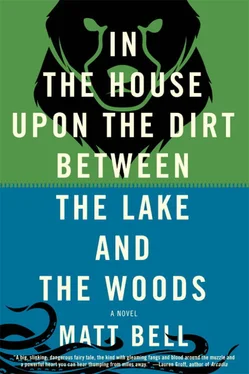When at last it was safe I stood and found my balance and looked toward the shore, through the swirling debris and dirt clouds, and there I was sure I spied some portion of the house still standing, set upon a promontory shoved up through the cracking of the earth. Behind it I saw the woods aflame, and from those woods came again the bear, her brutish shape emerging grotesque from the fire. I could not possibly have heard her above the loud discord of the dirt’s destruction, but when I saw her bared teeth and angry stance upon the shore I imagined her hoarsened sound calling across the lake, and then I lost sight of her in the confusion. A moment later I again thought I saw her fur-bare armor silhouetted against the fire, imagined the sizzle of exposed bone, that terrible pain issuing from her lungs. I watched for her where I could, but more than I wanted to know where she was, I wanted only for her to be gone, and then I saw her leaving, a blank shadow turning slowly in a sea of red flames, returning the way she had come, back into the blazing trees.
Lightning cracked above, true lightning not stuck but fresh and flashing, and the rain turned to downpour turned to storm, and upon the lake the salt water chopped, the surface rough where it had been the stillest. The foundling and I were tossed in our rowboat as I put the oars to the waves, pulled hard for shore, but we were too far out, and the water was too churned, and any begging for help I directed at the fingerling fell unanswered on his dumb lumps. Soon our route went wide of the right line to shore, and then I pounded my fists against my choked thighs, pleaded with that one son to help me save the other, regardless of their bad blood, the no blood between them, and then I roared too, until my tears and my noise frightened the foundling, frightened him as bad as the falling sky, the dark clots of flung-up dirt still crashing into the water all around, the shore collapsing into the lake even as we tried to reach it. The foundling screamed for me to stop as I screamed at the fingerling to do the same, until our voices were interrupted by the next disruption of the dirt, the second such shaking, and then some angry waves shook out across the surface of the lake, raising the rowboat high upon their crests, then dropping it down into unsteady furrows, where from its flat bottom we watched the water climb in high battlements above us, and when those battlements collapsed their cold contents filled the trough between with more water, caved wet walls crashing in.
THE EDGE OF THE OVERTURNINGrowboat struck the foundling first and then me, knocking me somewhere in the back of the head or between the head and the neck, in some awkward place where I could not reach the injury, not while I kicked for the surface, and not afterward, while I struggled against the waves and searched the surface for the foundling. At last I saw him already heading toward the burning dirt, the house or house-hole remaining, and while I wanted to hurry after him I was not sure I could make it to the shore. I treaded water as best I could, but I tired fast with the drag of my new wound, and so I struggled only until his stroking form was small in the distance, close enough to shore that I could imagine his safe arrival, and then I did not try to follow.
Instead I made myself believe it was not just whale that inhabited our lake but another as well, the two connected by ghost , and for once the fingerling did not fight me but instead encouraged the story I was telling. At his suggestion I sank like a stone, like the stone of my heart, like the stone knife of the fingerling scraping at the walls of my heart, slashing toward escape, and in that passage into darkness something else shifted, for as I swam and sank and broke my chest to breathe I did not die, and around me the water seemed to be salt water no longer, not exactly, but instead both salt and water, and as I fell also again something thicker, more slippery, blacker even than the dark water, a sea of ink where once there was a lake of salt.
I threw myself ever lower, tunneled into the water at the fingerling’s command, this swimming motion almost all he knew from his short life, his too-quick float in his mother’s belly. All of me ached now, and still there was farther to go. I begged off, begged to rest, to quit, but then the fingerling spoke again, his heavy words dragging me down, forcing me under.
He said, IN THE WOMB, IF YOU STOPPED SWIMMING, THEN YOU DIED.
He said, ONCE, I THOUGHT THE WOMB WAS THE WORLD, AND THEN WHEN THAT WORLD REJECTED ME WHAT OTHER CHOICE EXISTED EXCEPT DROWNING, EXCEPT HOLDING MY BREATH UNTIL I BURST?
NOW DIVE, he said, and so I dove, swimming until I reached the bottom of the lake, but not the bottom of its center I had expected, only its center’s edge, its near shelf, the drop-off where the safe part of the water ended, the coolness below the burning surface above, where that band of cool fell down into colder darkness. On that shelf I leveraged myself lower, and also I felt the first floating strands of gunked eggs, unfertilized and untended and half gnawed, a thousand wasted babies, food for the silver faces of the lake’s fish, those blank expressions surrounding our dive, our pursuit into the thick black of the cloud below. I kicked deeper, drove our bodies down with the movement of my good leg and then my bad leg and then my good leg again, but despite my effort I did not make it to the center of the lake alone or even alone with the fingerling.
I could not have, not even before my crushed ankle or my other newest injury.
Now I knew that what still lived in the lake had many names and shapes but was then best titled squid , and although the bear thought it dead it was not exactly, and after its long-lashing reach hooked my skin I thought I would drown, but no, I did not die, not then.
HE COMES, said the fingerling, HE COMES AND HE IS YOU AND YOU ARE HIM AND NOW AT LAST YOU ARE BOTH HERE TOGETHER, and the fingerling’s voice was a hissing threat but also quieter than any other time of late, a hush that made me more afraid, and I felt him withdraw into his stomach-pit, and then the lake’s giant squid struck, reached out from the black beneath the lake to wrap me in its rough-puckered tentacles, to slash my skin with their barbed hooks.
I exhaled a scream of bubbled air, struggled to free myself even as the squid bid me to be still, fixing me with one huge eye and then the other. After some time the squid began to speak as the bear spoke, in an old language translated by the fingerling, its tentacle-shrouded beak snapping close to my face, saying that there was more to the making of a child—of a family—than just two bodies, than two bodies and an empty set of rooms.
It said, I AM LIKE YOU, BUT I AM NOT YOU, and when its voice thrashed against the sides of my skull I knew it was no real squid, only a ghost in the shape of a squid, and in my drowning I believed I smiled, and even in my stomach the fingerling laughed, as if ghosts were no danger, as if ghosts and their memories had not been the whole of our undoing.
The squid-ghost circled me in the floating blackness, and as it circled it spoke, and with words barely words, it said, YOU SEEK TO MAKE ONLY A CHILD, ONLY A HANDFUL OF CHILDREN, BUT I WANT MORE.
It said, YOU HAVE SEEN THE EGGS I KEEP, THE EGGS I TOOK FROM MY WIFE WHEN LAST SHE SWAM IN HER FIRST SHAPE.
It said, THEY ARE LESS NOW, BUT THEY ARE STILL MINE, AND STILL THEY ARE IN NEED OF A GOOD FATHER, and then it sprayed wide clouds of useless ghost semen and blackest ink, twin excretions fogging the deep lake.
It said, WHAT YOUR WIFE CANNOT MAKE, MINE ONCE REFUSED ME.
It said, AFTERWARD, I TRIED TO KILL MY WIFE AS YOU TRIED TO KILL YOURS, BUT I COULD NOT SUCCEED AS YOU HAVE, and as it said this I shook, because despite the fall of her moon I did not believe my wife was dead. And then the squid spoke again, said, KILL HER FOR ME, its tentacles drawing me close, the hard shell of its body long against me, and against its grip I shook my head, struggled again to escape.
Читать дальше












